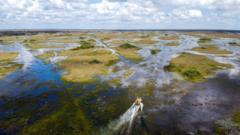Is Florida Creating an Alligator Alcatraz for Migrants in the Everglades?

Understanding the Controversial Plan for a Detention Center in Florida's Everglades
The recent announcement by the Department of Homeland Security regarding the construction of a detention center in Florida's Everglades has stirred significant debate. Dubbed "Alligator Alcatraz," this facility is intended to temporarily hold migrants as part of a broader strategy to enhance immigration enforcement under the Trump administration. The plan not only raises questions about immigration policy and enforcement but also poses significant environmental concerns, particularly regarding the delicate ecosystem of the Everglades. In this article, we will delve into the implications of this development, exploring its potential impacts on the environment, the community, and the broader immigration landscape.
The Rationale Behind the Detention Center
As the Biden administration grapples with immigration issues, the Trump administration's effort to ramp up deportations has gained renewed focus. Secretary Kristi Noem emphasized the need for "cost-effective and innovative" solutions to address illegal immigration, stating that the facility would be part of a larger strategy to fulfill the American people's mandate for mass deportations. This approach aligns with the administration's broader goal of enforcing immigration laws more stringently.
According to reports, the detention center is expected to be funded "in large part" by the Federal Emergency Management Agency's (FEMA) shelter and services program, which has previously supported accommodations for undocumented migrants. This financial backing indicates a significant investment in expanding the country’s immigration enforcement capabilities.
Location and Construction Timeline
The proposed site for the detention center is at the Dade-Collier Training and Transition Airport, approximately 58 kilometers (36 miles) from Miami. This location has been characterized as "virtually abandoned," which may have played a role in its selection for this controversial project. Florida's Attorney General, James Uthmeier, has projected that the facility could be operational within 30 to 60 days, with the capacity to hold around 1,000 individuals.
Uthmeier has also argued that the location serves a dual purpose: not only does it provide a temporary holding facility, but it also acts as a natural deterrent against escape attempts. He noted that should individuals manage to flee, they would encounter the hazards of the surrounding environment, including alligators and pythons, effectively limiting their options for escape.
Environmental Concerns
One of the most significant criticisms of the Alligator Alcatraz project comes from local lawmakers and environmental advocates. Miami-Dade County's Democratic mayor, Daniela Levine Cava, has voiced her concerns about the potential "devastating" impacts on the Everglades ecosystem. The Florida Everglades is a unique and vital environmental region characterized by marshes, prairies, forests, mangroves, and estuaries, which collectively support a diverse array of wildlife.
Potential Impacts on the Everglades Ecosystem
The construction and operation of a detention center in such a sensitive area raise numerous environmental questions, including:
- Habitat Disruption: Building a facility in the Everglades may disrupt local wildlife habitats, particularly for species that rely on the delicate balance of this ecosystem.
- Water Quality Concerns: The introduction of a large human population in the area could lead to pollution and other issues that may compromise water quality, affecting both flora and fauna.
- Climate Resilience: The Everglades play a crucial role in climate regulation and flood control. Disrupting this environment may have broader implications for climate resilience in the region.
Environmental experts and advocates are urging local and federal authorities to consider these potential repercussions seriously. The long-term health of the Everglades is paramount, and any development that threatens this ecosystem must be scrutinized thoroughly.
Community Reactions
Community responses to the proposed detention center have been mixed. While some residents express support for increased immigration enforcement, others are alarmed by the potential environmental impacts and the ethical implications of detaining migrants in such conditions.
Local leaders have raised concerns about the potential strain on resources, including emergency services and infrastructure. The influx of detainees could overwhelm local systems, raising questions about how the community will adapt to this significant change.
Voices from Local Government
Local government officials, including the mayor of Miami-Dade County, have voiced their opposition to the plan. Criticism has centered on the prioritization of immigration enforcement over environmental protection and community well-being. Key points of contention include:
- The lack of public input in the decision-making process.
- The potential for increased tensions between law enforcement and immigrant communities.
- The ethical implications of detaining individuals in a facility designed to capitalize on their vulnerability.
The Broader Implications for Immigration Policy
The establishment of the Alligator Alcatraz detention center reflects broader trends in U.S. immigration policy, particularly under the Trump administration. This facility symbolizes a shift toward more aggressive enforcement measures, raising critical questions about the future of immigration in the United States.
Shifts in Immigration Enforcement
As the administration seeks to fulfill its promises regarding immigration reform, the detention center may serve as a model for future facilities across the country. This shift may lead to:
- Increased Detention Capacity: A focus on expanding facilities to accommodate more migrants could result in a significant uptick in detention rates.
- Changes in Legal Proceedings: The use of expedited processing for detainees may alter the landscape of immigration hearings and legal recourse for individuals seeking asylum.
- Community Relations: Strained relations between local communities and federal authorities may become more pronounced as enforcement efforts intensify.
Conclusion
The decision to construct a detention center in Florida's Everglades has sparked a complex debate that intertwines immigration policy, environmental conservation, and community welfare. As the Trump administration seeks to enforce stricter immigration measures, the implications of this facility reach far beyond its immediate purpose. The potential environmental impacts raise significant concerns, and community voices must be heard in the decision-making process.
As this situation unfolds, it is crucial for stakeholders—including local residents, environmental advocates, and policymakers—to engage in meaningful dialogue to navigate these challenges. The future of immigration policy and environmental stewardship in Florida hangs in the balance, and the choices made today will resonate for generations to come.
FAQs
Why is the detention center being built in the Everglades?
The detention center is being constructed to temporarily hold migrants as part of the Trump administration's strategy to ramp up deportations and enhance immigration enforcement.
What are the environmental concerns associated with the facility?
Critics argue that the facility could disrupt local wildlife habitats, compromise water quality, and undermine climate resilience in the Everglades ecosystem.
How will the local community be affected by the detention center?
The local community may experience increased strain on resources and potential tensions between law enforcement and immigrant communities as a result of the facility's operation.
As the situation develops, how do you think the balance between immigration enforcement and environmental protection should be managed? #ImmigrationPolicy #EnvironmentalJustice #FloridaEverglades
Published: 2025-06-24 02:17:08 | Category: wales



